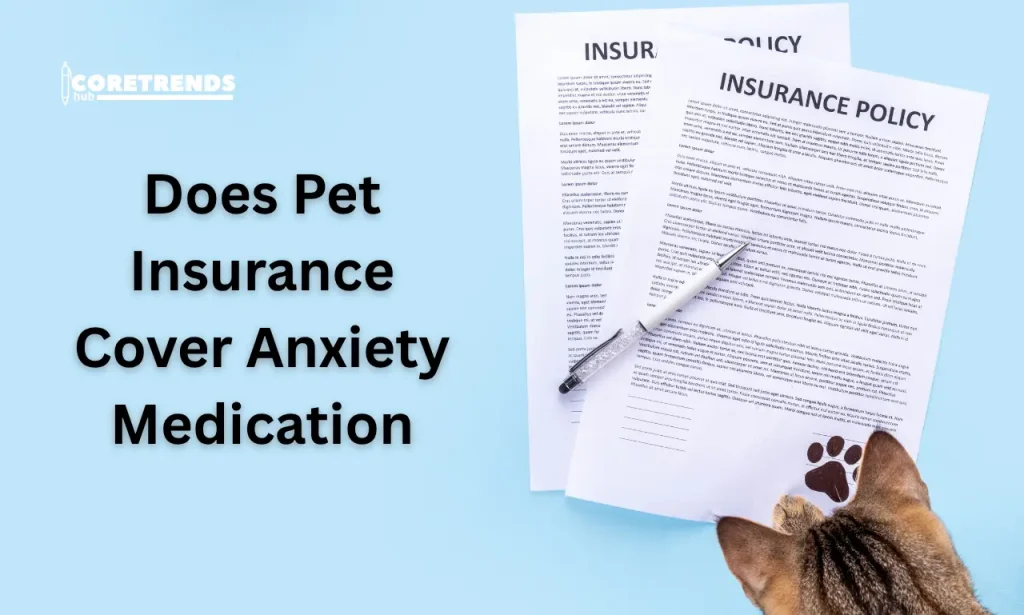Pet anxiety matters because it affects their health and happiness. Just like humans, pets can feel stressed, scared, or nervous. If anxiety is ignored, it can lead to behavior problems like aggression, excessive barking, or destructive chewing. It can also cause physical issues such as loss of appetite, vomiting, or poor sleep. Understanding anxiety helps pet owners provide the right care and support. It ensures pets live a calmer, healthier life and strengthens the bond between pets and their owners.
Medication plays an important role in treating pet anxiety. Sometimes, behavior changes or training alone are not enough. Vets may prescribe anxiety medications to help pets feel calmer. These medications can reduce stress and prevent severe anxiety attacks. They are often used along with therapy or behavior training for best results.
Table of Contents
Common Anxiety Medications for Pets
Prescription Medications
Pets with anxiety are often prescribed medications like fluoxetine, clomipramine, and sertraline. These drugs work by balancing brain chemicals that affect mood and stress levels. They are usually given daily and may take several weeks to show full effects. Vets monitor pets closely to adjust the dose and ensure safety.
Over-the-Counter Options and Natural Supplements
Some pets may benefit from CBD oil, calming chews, or pheromone diffusers. These products can help reduce mild anxiety, especially in situations like thunderstorms or travel. While not as strong as prescription medications, they can improve a pet’s comfort and work well alongside training or behavior therapy.
Consulting a Veterinarian
It is important to always consult a veterinarian before giving any medication or supplement. Vets can recommend the safest options, check for possible side effects, and guide the correct dosage. This ensures the treatment is both safe and effective for your pet’s specific needs.
How Pet Insurance Works
Pet insurance helps cover the cost of your pet’s medical care. There are different types of plans to choose from. Accident-only plans cover injuries like cuts or broken bones. Comprehensive plans cover accidents, illnesses, and sometimes routine care like vaccinations. Choosing the right plan depends on your pet’s age, health, and your budget.
When your pet needs treatment, you usually pay the vet first and then submit a claim to your insurance company. The company reviews the claim and reimburses you for eligible expenses based on your plan. Some insurers may pay the vet directly, but most work on a reimbursement basis.
Pet insurance comes with coverage limits and deductibles. Coverage limits are the maximum amount the insurance will pay per year or per condition. Deductibles are the amount you pay out of pocket before the insurance starts covering costs. Knowing these details helps you avoid surprises when claiming.
Not all treatments are covered under pet insurance. Many plans exclude pre-existing conditions, certain medications, or elective procedures. It is important to read your policy carefully to understand what is included and what is not. This ensures you make informed decisions for your pet’s care.
Coverage of Anxiety Medication
Pet insurance may cover anxiety medication, but it depends on your plan and the situation. Some comprehensive plans include prescription medications if they are needed to treat an illness or a diagnosed condition. This means if your pet’s anxiety is diagnosed by a vet, the cost of the prescribed medication may be partially or fully reimbursed.
However, coverage is not guaranteed. Many insurance plans exclude pre-existing conditions, which means if your pet had anxiety before the policy started, the medication might not be covered. Some plans also limit coverage for behavioral or non-life-threatening conditions, so mild anxiety treatments might not qualify.
It is important to check your policy carefully and ask your insurance provider about specific coverage for anxiety medications. Keeping detailed vet records and prescriptions can help increase the chances of approval. Understanding the rules ensures you know what costs to expect when managing your pet’s anxiety.
Factors Affecting Insurance Approval
Pre-existing Conditions
Insurance companies often do not cover conditions your pet had before the policy started. If your pet already showed signs of anxiety, the medication may be denied. Policies typically cover only new conditions that develop after enrollment. This makes it important to enroll pets early, before any health issues appear.
Policy Terms and Limits
Each insurance plan has its own rules about coverage. Limits, annual maximums, and restrictions on certain medications can affect approval. Some plans may cover only part of the cost or set caps per condition. Reading the policy carefully helps avoid unexpected out-of-pocket expenses.
Veterinarian Recommendations
Insurance approval often depends on a vet’s diagnosis and prescription. Detailed documentation from your veterinarian explaining the need for anxiety medication increases the chances of approval. Notes about symptoms, treatment history, and progress can strengthen your claim.
Pet Age and Breed
Older pets or certain breeds with known health risks may face stricter approval rules. Insurers may charge higher premiums, reduce coverage, or limit benefits for pets with higher risk factors. Understanding these restrictions helps you plan treatment costs in advance.
Type of Medication
The specific medication prescribed can affect coverage. Insurance may cover FDA-approved prescription drugs but exclude supplements, natural remedies, or off-label medications. Checking with your provider before starting treatment ensures the medication qualifies for reimbursement.
Limitations and Exclusions
- Pre-existing Conditions: Most insurance plans do not cover conditions your pet had before the policy started. If your pet showed signs of anxiety earlier, the insurance may not pay for medication or treatment related to it.
- Age Restrictions: Some policies limit coverage for older pets. As pets age, insurers may reduce benefits or exclude certain treatments, including anxiety medication, to manage risk.
- Breed-Specific Exclusions: Certain breeds are prone to specific health issues. Some insurance providers may exclude coverage for conditions common to your pet’s breed, which can affect approval for anxiety treatments.
- Experimental or Off-Label Treatments: Medications not officially approved for pets, or treatments considered experimental, are often excluded. Insurance usually covers only approved medications prescribed by a veterinarian.
- Coverage Caps and Limits: Insurance plans have annual or per-condition maximums. Even if a medication is covered, you may only get reimbursed up to a certain amount, so costs beyond the limit are your responsibility.
Alternative Options for Managing Anxiety
Behavioral Therapy
Behavioral training can help pets manage anxiety without relying solely on medication. Techniques include desensitization, counter-conditioning, and reward-based training. Working with a professional trainer or behaviorist can reduce anxiety triggers and improve your pet’s confidence over time.
Environmental Adjustments
Changing your pet’s environment can help them feel calmer. Creating a quiet space, using calming music, or providing safe toys and hiding spots can reduce stress. Consistent routines and minimizing sudden changes also help pets feel secure.
Natural Remedies and Supplements
Some pets benefit from natural options like CBD oil, calming chews, or pheromone diffusers. These can help reduce mild anxiety, especially during stressful events like thunderstorms or travel. Always check with a veterinarian before using supplements to ensure safety and effectiveness.
Exercise and Mental Stimulation
Regular exercise and mental activities, like puzzle toys or interactive games, can reduce anxiety by releasing energy and keeping pets mentally engaged. Physical and mental stimulation helps improve overall mood and behavior.
Conclusion
Pet anxiety can affect their health and happiness. Medications often help pets feel calmer, but the cost can be high. Pet insurance may cover anxiety medication, but it depends on your plan, your pet’s history, and the type of medication prescribed. Understanding your policy and keeping detailed vet records can improve your chances of coverage.
Not all plans cover every medication, and exclusions like pre-existing conditions or age limits may apply. Alternative options like behavior training, environmental changes, and natural supplements can also help. Knowing your choices helps you make the best decisions for your pet’s care and well-being.



